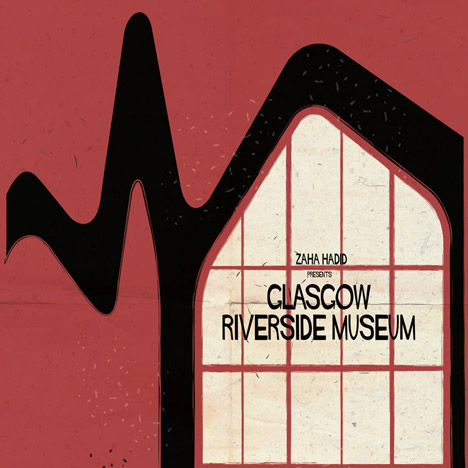Iconic buildings, from Pierre Chareau's Maison de Verre to Zaha Hadid's Glasgow Riverside Museum, have been transformed into classic movie posters in the latest series by Italian illustrator Federico Babina.
Recreating the graphic style and typography of American graphic designer Saul Bass, Federico Babina has transformed 23 buildings into film posters – presenting the name of each project as a movie title and naming every architect as director.
For each image, Babina chose to zoom in on a certain section of the selected building, which prompted the project title Archizoom.
"As with the zoom lens of a camera I approached the architectural works in order to depict a detail or some small elements, focusing on a component to talk about the whole," explained Babina.
"Outlining an architecture through a narrow viewpoint turns it into a movie poster that shows the author and their work," he said.
Babina – whose previous illustrations include architects' portraits made up of elements of their buildings – began the series with the Kimbell Art Museum by Louis Kahn, which was completed in the 1970s.
He then moved back and forward through the 20th and 21st centuries, from Rietveld's Schröder House of the 1920s to Hadid's museum, which opened in 2011.
Other subjects include the spiralling form of Frank Lloyd Wright's Guggenheim and the latticed facade of Toyo Ito's Tod's Omotesando.
"The idea came from seeing an image of an actor's eyes," said Babina. "This shooting range is sometimes more powerful than a face or a whole body, and it is able to tell intense emotions and allow us to recognise the protagonist."
"I wanted to do the same with some emblematic architectural works," he continued. "Approaching them with a zoom of the imagination, I depict only certain parts of a building, but they are able to reveal just as much about the aesthetics of the author."
Some of the most detailed closeups include a view of the Centre Pompidou by Richard Rogers and Renzo Piano, as well as a section of Mies van der Rohe's Barcelona Pavilion.
Others are more zoomed out, from the Satellite Towers of Mexican architect Luis Barragán to the Zollverein School completed by Japanese firm SANAA in Germany.
Babina said that the most important but also most challenging aspect of the drawing process was finding the detail that best represented each architectural work.
"The importance of the poster for a movie is that it is a key visual element, which informs and seduces us through various codes, signs and symbols that reflect the content and the basic aspects of the film," he stated.
"In this way, the intent of these posters is to attract attention and serve as a stimulus to be able to imagine and enjoy architecture," he added.
"The posters should not be explicit but only suggestive and insinuating. They must have the ability to convey the essence through a single static image that allows the imagination to give it movement and action."
Other projects immortalised in the series include Tadao Ando's Church of the Light, Carlo Scarpa's Brion Cemetery, Le Corbusier's Chandigarh Assembly Building and Jørn Utzon's Sydney Opera House.
Archizoom follows a string of architecture-themed posters created by Federico Babina. Others include iconic works of art reimagined as building elevations and famous film set designs translated into detailed cross sections.

